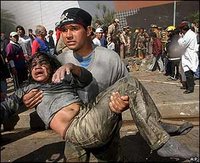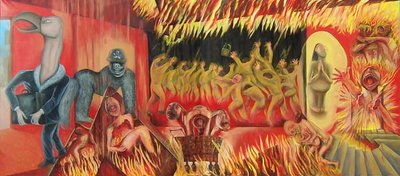One of the most interesting (and also moving) experiences of the past two weeks was to visit the site of the Ycuá Bolaños tragedy in Asunción.
 From Paraguay, ABC Digital has a page on "La tragedia de Ycuá Bolaños", with links to many articles on the case and recent updates. There's also "La investigación de Ycuá Bolaños", a site with pieces that are more reflective or critical. And here is the BBC report immediately following the incident.
From Paraguay, ABC Digital has a page on "La tragedia de Ycuá Bolaños", with links to many articles on the case and recent updates. There's also "La investigación de Ycuá Bolaños", a site with pieces that are more reflective or critical. And here is the BBC report immediately following the incident.In short, however, on August 1st 2004 a fire gutted a huge supermarket in suburban Asunción. The fire started thanks to design flaws (a chimney that couldn't be cleaned), and was aggravated by inattention to building codes. But it became a disaster in which over 400 people died when the supermarket owner ordered the doors locked so that shoppers wouldn't rob the store of its produce en route to escaping with their lives.
Almost two years later, though the owner is in custody, he is due to be released if the Paraguayan judicial system doesn't come up with at least a provisional verdict (a "juicio oral") that assigns some culpability for the blaze and for the ensuing deaths.
The ruin itself is still remarkably intact: you can see the check-out counters, the shelving, piles of half-incinerated toothpaste tubes or bags of flour, half-melted crates of coke and so on. To one side, families of victims have constructed a kind of sanctuary, full of shrines to their deceased relatives. And though (because?) these shrines are decorated in typically kitsch Latin American style--fairy lights, plastic figurines of angels, and so on--the place is incredibly moving.
Relatives come by the sanctuary, to comb once more through the wreckage, to meet up with other victims, to hang out, to talk, to plan their next demonstration against an incredibly corrupt and inefficient judiciary.
Different movements have sprung up in the wake of the disaster, some more militant than others. The most radical is the Collective "Ni olvido ni perdón" ("No forgetting, and no forgiveness"). I talked for some time with a very articulate--and justifiably enraged--member of this group. But even for the more moderate elements of the movement, the attempt to win justice has become a fully-fledged battle against the state.
Many of these groups' slogans (such as "Nunca más" or "Never again") are taken directly from the movements that struggled against the Southern Cone dictatorships of the 1970s and 1980s. Moreover, the Paraguayans now have links and contacts with organizations such as Argentina's Mothers of the Disappeared.
So what's interesting is that some time after one of the longest dictatorships in Latin American history (Stroessner's 36 years in which the country was his personal fiefdom), and as a result of an incident in which capital, the state, and the law directly coincide, something in Paraguay may finally be awakening.

No comments:
Post a Comment